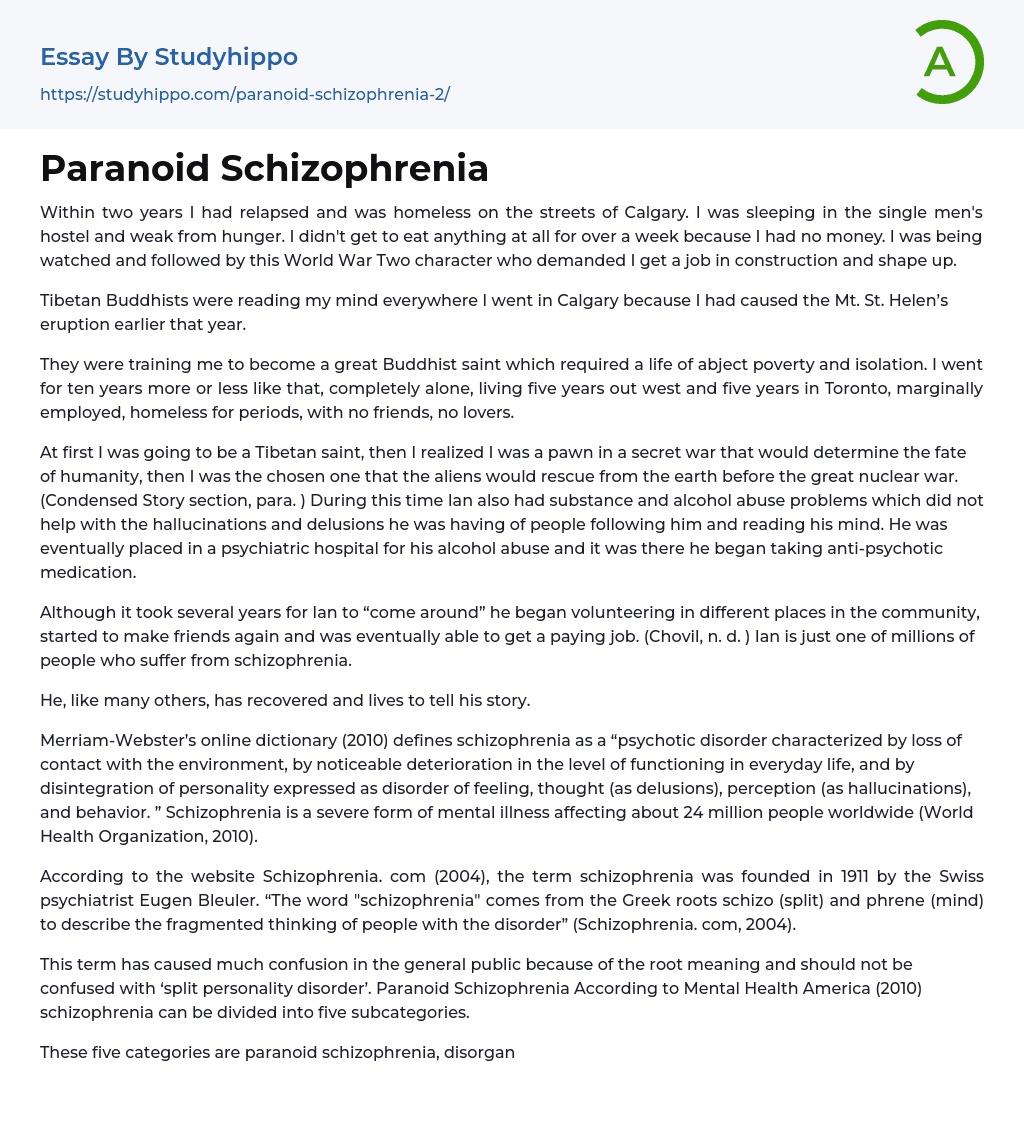Within two years I had relapsed and was homeless on the streets of Calgary. I was sleeping in the single men's hostel and weak from hunger. I didn't get to eat anything at all for over a week because I had no money. I was being watched and followed by this World War Two character who demanded I get a job in construction and shape up.
Tibetan Buddhists were reading my mind everywhere I went in Calgary because I had caused the Mt. St. Helen’s eruption earlier that year.
They were training me to become a great Buddhist saint which required a life of abject poverty and isolation. I went for ten years more or less like that, completely alone, living five years out west and five years in Toronto, marginally employed, homeless for periods, with n
...o friends, no lovers.
At first I was going to be a Tibetan saint, then I realized I was a pawn in a secret war that would determine the fate of humanity, then I was the chosen one that the aliens would rescue from the earth before the great nuclear war. (Condensed Story section, para. ) During this time Ian also had substance and alcohol abuse problems which did not help with the hallucinations and delusions he was having of people following him and reading his mind. He was eventually placed in a psychiatric hospital for his alcohol abuse and it was there he began taking anti-psychotic medication.
Although it took several years for Ian to “come around” he began volunteering in different places in the community, started to make friends again and was eventually able to ge
a paying job. (Chovil, n. d. ) Ian is just one of millions of people who suffer from schizophrenia.
He, like many others, has recovered and lives to tell his story.
Merriam-Webster’s online dictionary (2010) defines schizophrenia as a “psychotic disorder characterized by loss of contact with the environment, by noticeable deterioration in the level of functioning in everyday life, and by disintegration of personality expressed as disorder of feeling, thought (as delusions), perception (as hallucinations), and behavior. ” Schizophrenia is a severe form of mental illness affecting about 24 million people worldwide (World Health Organization, 2010).
According to the website Schizophrenia. com (2004), the term schizophrenia was founded in 1911 by the Swiss psychiatrist Eugen Bleuler. “The word "schizophrenia" comes from the Greek roots schizo (split) and phrene (mind) to describe the fragmented thinking of people with the disorder” (Schizophrenia. com, 2004).
This term has caused much confusion in the general public because of the root meaning and should not be confused with ‘split personality disorder’. Paranoid Schizophrenia According to Mental Health America (2010) schizophrenia can be divided into five subcategories.
These five categories are paranoid schizophrenia, disorganized schizophrenia, catatonic schizophrenia, residual schizophrenia, and schizoaffective disorder. Charles R. Lake (2008) says that of the five subcategories “paranoid remains the most common subtype of schizophrenia” (p.
1151). iHealth (2010) reports that paranoid schizophrenia seems to appear earlier in life for men than for women. Young men are usually diagnosed with paranoid schizophrenia in their late teens or early twenties. Women do not usually show signs of paranoid schizophrenia until they are in their twenties or early thirties.
When looking at the comparisons of schizophrenia between
males and females there is little difference.
Piccinelli and Gomez Homen (1997) summarize it: Incidence rates of schizophrenia vary widely across studies and countries. Moreover, no consistent pattern of gender differences in incidence rates of schizophrenia has been detected. Indeed, most studies have reported that incidence rates are similar in males and females. On the other hand, when gender differences are detected, incidence rates are higher among the males.
There is some evidence that higher incidence rates among the males occur especially in the younger age groups, whereas a female preponderance has been reported among individuals with first-onset schizophrenia after age 45. (p. 80) Prior to the actual psychotic symptoms of paranoid schizophrenia, there is a period called the prodromal phase. Yung and McGorry (1996) define prodrome as “the term [that] refers to a period of prepsychotic disturbance, representing a deviation from a person's previous experience and behavior.
- Emergence essays
- Anxiety Disorder essays
- Post-traumatic Stress Disorder essays
- Insanity essays
- Addiction essays
- Anatomy and Physiology essays
- Biodegradation essays
- Cancer essays
- Dental Care essays
- Disability essays
- Disease essays
- Disorders essays
- Health Care essays
- Infectious Disease essays
- Inquiry essays
- Intelligence Quotient essays
- Lung Cancer essays
- Medicine essays
- Neurology essays
- Nutrition essays
- Olfaction essays
- Physical Exercise essays
- Public Health essays
- Sex essays
- Women's Health essays
- World health organization essays
- Adhd essays
- Antisocial Personality Disorder essays
- Anxiety essays
- Bipolar Disorder essays
- Depression essays
- Depression And Anxiety essays
- Dyslexia essays
- Learning Disability essays
- Major Depressive Disorder essays
- Mental Disorder essays
- Mental Illness essays
- Psychosis essays
- Schizophrenia essays
- Stress essays
- Suicide essays




